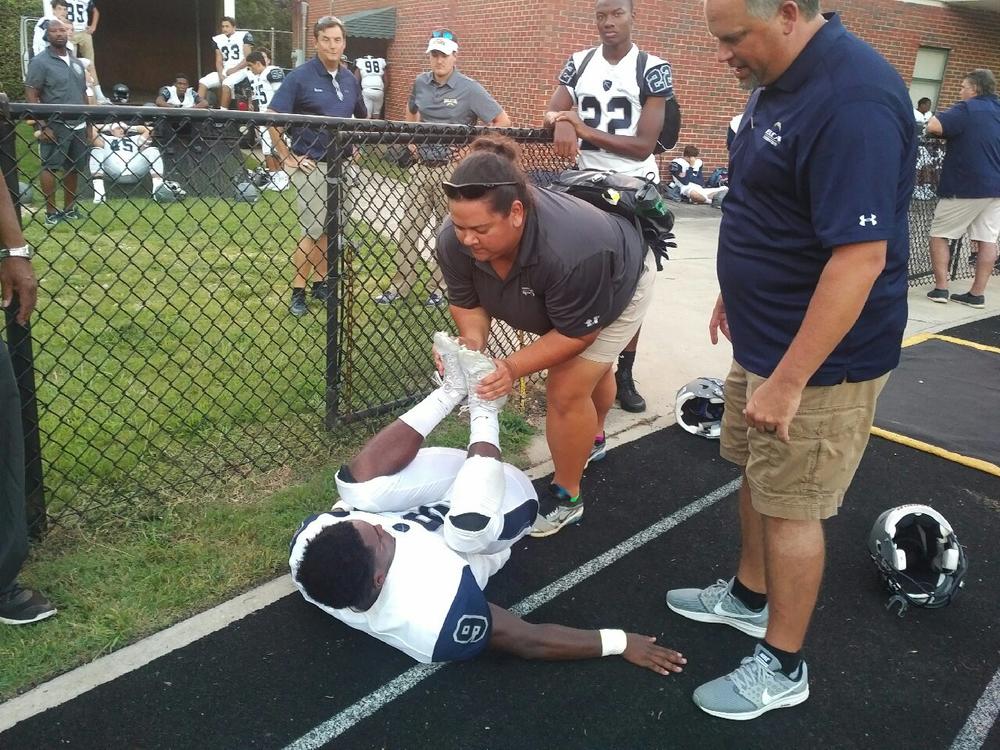
Section Branding
Header Content
The 12th Man
Primary Content

They are a vital part of Football Fridays In Georgia; although, they seldom come onto the field. They are present on the sidelines and if all goes well, they will remain there throughout the night. Certified athletic trainers have become a necessary part of the high school football scene. A trained healthcare professional can provide an advantage that makes them more like a 12th man to the team that they serve, but it wasn't always that way.
For many years there was nobody with any medical training on the sidelines during high school football games. Most of the time it was a coach, maybe the head coach, who had to decide if the player continued to play after an injury. Wrapping and taping was basically what they did, but the role of trainer wasn't reserved just for coaches.
"In 1996, at Brookwood, we had a mortician working as a trainer on the sidelines," remembers Dr. Gary Levengood. “He was giving the coach heart medicine and the coach didn't have a heart problem."
The next year, Levengood, Founder of Sports Medicine South, saw to it that Brookwood had a certified athletic trainer. Levengood appealed to Gwinnett Medical Center to get involved. "As a community outreach, we needed to have athletic trainers at all of the high schools in the county," says Levengood. "We need to have someone on the sideline during the game and at practice during the week".
It makes sense, having someone assigned to a school to be at the games and at practices allows the trainer to observe the player more and develop a one-on-one relationship. In so doing, that training earns the respect and trust of parents and school administrators. "The trainers being around the kids all year is a huge advantage in treating them," says Dr. Dale Yake, CEO of PT Solutions. "We know how to get them back on the field and get them back on safer so they don't end up with a bigger injury."
These days the most important role of the athletic trainer on Friday nights is the diagnosis and treatment of concussions. Not only are they helping today's players, but they are also helping to preserve the game for the future. "Concussions are what is going to kill this sport." says Levengood " It's causing parents to reconsider whether their kids should play football or not."
Dr. Yake agrees that head injuries could have a bad impact on the sport's future. "I'm on the Board of Directors of the Concussion Legacy Foundation in Boston," says Yake. " Managing the game is key. When we recognize concussion symptoms we manage that quickly and [try to] not allow a second impact."
Yake also likes the trends of playing flag football before the age of 14 and high schools limiting full contact at practice to once a week. Levengood sums up the future this way, "As long as we train and do the needed things up front we're going to be ok. "
Certified athletic trainers making a difference on Friday nights around our state. It sounds great, but here is a downside. Not all schools or school systems in the state have athletic trainers. In fact, there are probably more schools that don't have trained medical professionals than those that do. Sure, there is a cost, and not all can hire the athletic trainers to be at the schools on game night and throughout the week for practice. This means that there are some games that are played without athletic trainers on either sideline. The trainers are not mandated by the GHSA. In fact, the GHSA only mandates that emergency vehicles be in place at playoff games.
Sports Medicine is a growing field in our state. I find it difficult to believe that there isn't a way to get interns and apprentices to be on sidelines on Fridays and visit practice at least once a week during football season. You would think that there would be an entity, institution or organization that would find it worthwhile to help provide an extra measure of safety for the young people that bring our communities so much pride and excitement on football Fridays.
The one organization that comes to mind for me is the National Football League Players Association. Georgia is the home of more retired NFL players than any other state. Each year scores of former Georgia high school players get to live the ultimate dream of playing in the National Football League. Why not unite NFLPA past and present to create a fund to help provide athletic trainer interns and apprentices for high schools that need them around the state. It would only require a modest donation from current players and would produce a living legacy for the NFL Alums. Consider it an investment, an investment in the health of the future of Football Fridays in Georgia.





